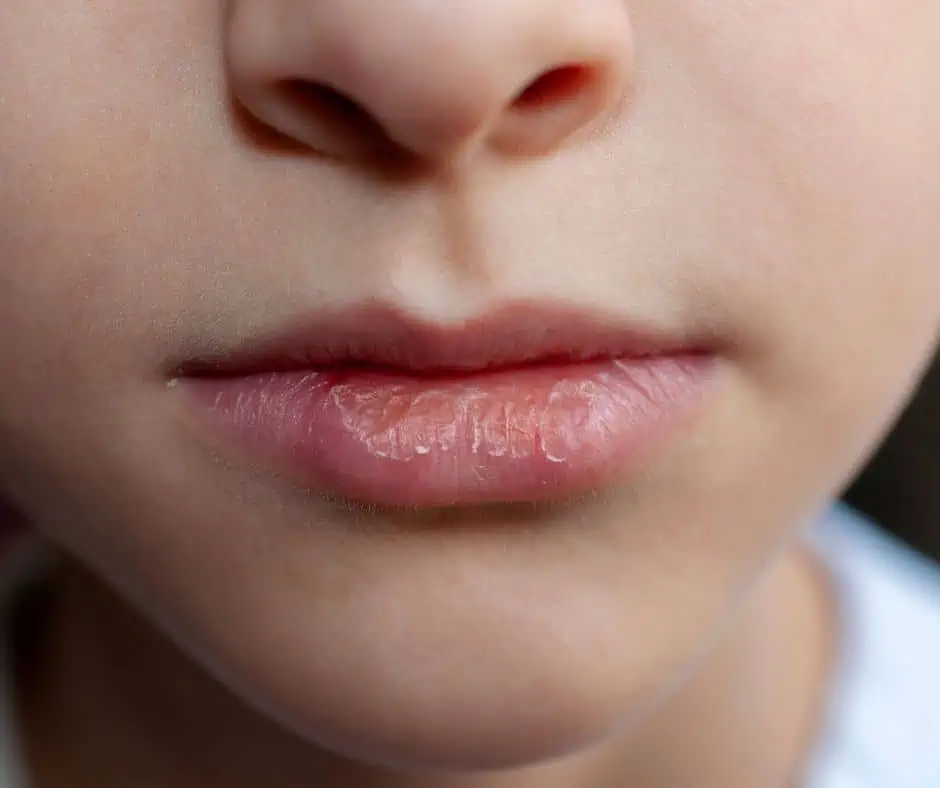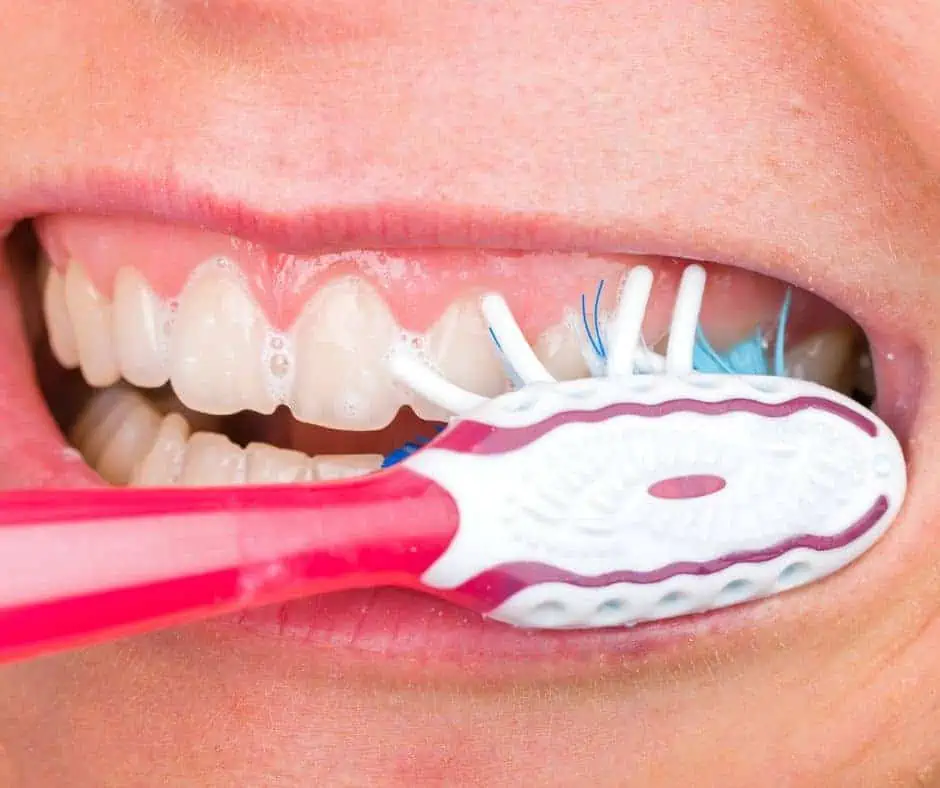What Causes Dry Mouth in Pregnancy and How to Combat It
This post may contain affiliate links. As an Amazon Associate, I earn from qualifying purchases.
Pregnancy is joyful, but your body may experience several changes and symptoms like neck pain, sensitive teeth, and so on. Dry mouth, a less common pregnancy symptom, is worth discussing because it can negatively impact oral health.
Fortunately, many simple treatments are available to relieve the dry mouth that might occur during pregnancy. But what should you do if your dry mouth is more severe than mild and gets in the way of your normal activities when pregnant? Is this cause for concern, and is there anything you can do about it? Keep reading to learn more.
Why Do I Have a Dry Mouth During Pregnancy?
The American Dental Association says that the changing hormones during pregnancy can cause dry mouth, also called xerostomia. This uncomfortable condition might affect dental health. Plaque and cavities can form more easily on teeth and gums if there isn’t enough saliva to flush away food particles and control microorganisms in the mouth.
A dry mouth might be caused by changing hormones or gestational diabetes. The National Health Service (NHS) reports that pregnant women with high blood pressure are more likely to get this kind of diabetes. Fortunately, this problem typically disappears after pregnancy.

Dry Mouth Pregnancy Causes
Most of the time, causes of dry mouth during pregnancy include the following:
Dehydration During Pregnancy
Dehydration occurs when the body loses more water than it consumes and can lead to a dry mouth. Dehydration can cause constipation in pregnant women, which is a common and uncomfortable condition. In extreme cases, dehydration can cause labor to begin prematurely. Therefore, you require more water than usual during this time.
Gestational Diabetes
High blood sugar can be a sign of gestational diabetes. Gestational diabetes arises when the body cannot produce the additional insulin required during pregnancy (typically NOT from issues with a healthy diet). This can cause complications for the mother and the baby, but it can be controllable with adequate care, including a good diet, exercise, and sometimes medication. Frequent symptoms of gestational diabetes include extreme thirst, exhaustion, and the urge to urinate more frequently.
Thrush
Thrush is caused when Candida albicans grow too much in the mouth. We all have a little Candida in our mouths, but if you have a weakened immune system or an imbalance of beneficial bacteria, it can get out of control. Changes in pregnancy can lead to these bacteria imbalances. Thrush can cause a dry, cottony sensation and sometimes pain in the mouth.
Sleeping Troubles
Pregnant women may have trouble sleeping, like snoring and sleep apnea. Snoring is very common during the third and sometimes even the second trimester of pregnancy. Smoking, being overweight, or having larger tonsils increases your risk. Hormonal changes can also make your nose and throat passages narrow, making breathing hard. When you snore, you sleep with your mouth open to breathe. This makes it hard to make saliva, which can cause your mouth to dry out.
What Signs and Symptoms Indicate Dry Mouth?
Common symptoms of pregnancy dry mouth include:
- The throat or mouth feels sticky and dry
- Sandpaper or cottony feeling in your mouth
- Frequent and excessive thirst
- Cracked lips, mouth ulcers, and mouth sores
- A feeling of dryness in the throat
- A sense of burning or tingling in the mouth, particularly on the tongue.
- Raw, dry tongue
- Lost sense of taste
- Speaking, chewing, tasting, and swallowing difficulties
- Dry nose, sore throat, and hoarseness are all symptoms.
- Bad breath

How To Relieve Dry Mouth During Pregnancy?
You’d be surprised to know that it’s pretty easy to get some dry mouth relief during pregnancy.
Keep Hydrated
Hydration is essential for preventing dry mouth during pregnancy. Each day, pregnant women should consume around ten 8-ounce glasses of fluids, ideally water. Other excellent choices include fruit juice, tea (uncaffeinated), and coconut water. Stay hydrated by drinking drinks throughout the day (just keep a water bottle nearby). You need more water if you have dark yellow urine (pee). You’re hydrated if it’s clear yellow.
Avoid Soda, Alcohol, And Coffee
It is recommended that you avoid coffee, soda, and alcohol because they all cause dehydration and dry up the mouth (and are not part of a healthy diet for pregnancy). You should already be doing this throughout pregnancy (or at least reducing caffeine consumption to an absolute minimum), so you must continue to follow this advice.
Ice Chips or Frozen Fruit
Keeping your mouth moist throughout the day by sucking on ice chips or even frozen fruit may help keep you hydrated, moisturize your mouth, and relieve any mouth sores that you may have. This is also a great trick during pregnancy for nausea too.
Use A Humidifier
Utilizing a humidifier at night maintains the humidity in the air and alleviates dry mouth. Always remember to clean and empty your humidifier regularly to prevent the formation of mold and bacteria. As bacteria prefer a warm, moist environment, selecting a “cool mist” humidifier reduces the danger of bacterial development.
Use A Chewing Gum or Hard Candy
Chewing on hard candy or sugar-free gum can help stimulate saliva and help moisten your mouth.
Avoid Eating Sweet and Salty Foods
Foods high in sugar and salt irritate and dehydrate your already parched mouth. So, avoid processed foods like ice cream, chocolate, pretzels, and potato chips that are high in salt and sugar.
Inhale Some Steam
Daily steam inhalation for 10 to 15 minutes dilates the airways and reduces dry mouth. Take some time and relax by taking a warm shower, warming some water in a kettle, and inhaling the steam from a mug. Alternatively, you might warm some water in the kettle and inhale the steam from a cup.
Try Ginger
It may be a relief to chew ginger or drink ginger tea because it stimulates the salivary glands and gives you a fresher mouth. Additionally, ginger is beneficial for pregnant women who experience morning sickness because it reduces nausea– a very common symptom of pregnancy.
When Should You See a Doctor?
You must see a doctor if home remedies fail to relieve your dry mouth. They can assess underlying causes and, if necessary, provide treatment for any issues with oral health. Additionally, you should consult a physician if you show the following symptoms:
- Thrush: You might have white spots that look like cottage cheese and redness or pain in your mouth.
- Gestational Diabetes: Excessive thirst, tiredness, and the need to go to the restroom more often.
- Tooth Decay: Mouth changes that affect your oral health- like gum bleeding (pregnancy gingivitis), a toothache that isn’t going away, your teeth hurting, and/or there are brown or black spots on them are indicative of tooth decay.
- Severe Dehydration: Not being able to keep any liquids down, vomiting, and passing black or bloody stools.
- Sleep Apnea: Getting excessively tired during the day, snoring, and waking up often during the night are signs of sleep apnea.

Conclusion
Pregnancy can bring about many different side effects such as hair loss, change of appetite, and dry mouth. But for every of those side effects, there are several methods you can try to either stop hair loss and regrow hair naturally, regain appetite, or fix dry mouth during pregnancy.
Hormonal changes and increased demand for fluids may cause dry mouth during pregnancy. Many strategies to alleviate this condition include increasing your water intake and chewing sugar-free gum. Consult a physician if home remedies do not relieve your dry mouth or if you have other signs of diseases such as gestational diabetes.
Have you had to deal with a dry mouth during pregnancy? What helped you the most?






